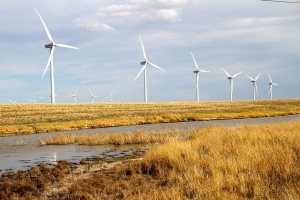Clean Energy Canada | The Conservative Party’s leadership race is crying out for a clean energy champion
February 22, 2020

Conservative parties in Canada don’t exactly have a reputation for environmentalism. The language of that movement—green this and radical that—isn’t really in their lexicon, as evidenced by last fall’s election campaign by the Conservative Party of Canada and Premier Jason Kenney’s creation of a “war room” to combat the “anti-energy campaign” after his United Conservative Party took power in Alberta
But now, the federal Conservatives are gearing up to choose a new leader. And as they work to figure out where the party goes from here, the facts on the ground—both in Canada and in the United States—suggest that there is more than enough room for a Conservative leader who is also a clean-energy champion.
Let’s start with the new electoral map. There are more renewable power projects in federal Conservative ridings than those of any other party. According to Clean Energy Canada’s analysis, seven of the 10 biggest wind-energy-producing ridings in Canada are represented by Conservative MPs. Similarly, eight of the 10 biggest solar-energy-producing ridings are Conservative, too.
This is not surprising, given rural and Prairie geography is often ideal for renewable power. It’s where the wind blows and the sun shines.
What might be more surprising is that in the United States, where rural ridings skew Republican, efforts by President Donald Trump to make coal great again have been rejected by Republican members of Congress who are more interested in opportunities developing wind and solar in their districts.
Take Texas as one example. Nowhere in the U.S. produces more wind power. The 13,000-plus turbines in the red state helped make wind-turbine technician the second-fastest-growing occupation in America in 2018. In first place? Solar-power installers. The U.S. Bureau of Labor Statistics forecasts that solar and wind power will lead job creation in the U.S. for the next decade.
Indeed, the rise of renewables has helped Texas farmers find stable sources of income amid the booms and busts of the oil industry and the floods that plague the region—floods that will only get worse with climate change.
The same is being projected for Canada. By 2030, more than 100,000 Canadians will have careers supplying and moving renewable power, with more than half-a-million jobs in Canada’s broader clean-energy sector (which includes, for example, electric-vehicle manufacturers and energy-efficiency specialists). For context, that’s an increase of 160,000 clean-energy jobs over the next decade, according to our research.
During that same period, Canada’s fossil-fuel sector is expected to shed 50,000 jobs, even as investment increases, as efforts to cut costs come at the expense of jobs.
But all those careers created in the clean-energy sector? It’s the good-news energy story Conservative leaders have failed to acknowledge. That needs to change. Jobs are not partisan, nor is economic stability through diversification.
According to our December, 2019, poll with Abacus Data, three-quarters of Canadians now say the transition to clean energy will benefit Canada in the long term. Even in Alberta, just more than half say it will benefit Canada, and nearly as many say it will benefit the province.
As for what we want from our federal government? Seven in 10 Canadians would prefer that Ottawa helps Albertan workers build new areas of economic opportunity, with only three in 10 preferring efforts to grow the oil sector. Opinion in Alberta is evenly split. For a party that wants to increase its base, it’s clear where that growth can be found.
But only if their efforts are sincere.
What the federal Conservatives put forward in the recent election campaign was not. Independent analysis found the Conservative climate plan would have actually increased carbon pollution between now and 2030, in contrast to the climate plans offered by Canada’s other major parties.
The Conservatives must do better. A serious climate plan requires a serious plan for the clean-energy sector. Canadians want a responsible transition. They want careers in clean energy and support for fossil-fuel workers affected by shifting global markets.
They don’t have to call it the green economy. They don’t have to use any of the watchwords of an often vilified movement. They can call it a diverse economy or a sustainable economy, or whatever else—just as long as whoever’s calling the shots in the party can answer Canadians’ calls.
This post was co-authored by Dan Woynillowicz and originally appeared in the Globe and Mail